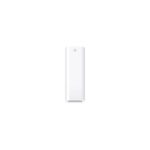Why Is My Butt So Itchy? This uncomfortable and often embarrassing question is one that many people experience. At WHY.EDU.VN, we provide you with comprehensive answers and solutions to help you understand and alleviate this common issue, offering insights into various underlying causes and practical remedies. Discover the factors that contribute to anal itching, or pruritus ani, and explore effective strategies for lasting relief, including LSI keywords like anal discomfort and itchy bottom.
1. Understanding the Basics of Anal Itching
Anal itching, medically known as pruritus ani, refers to the intense urge to scratch the skin around your anus. This condition can be incredibly bothersome, leading to discomfort, irritation, and sometimes even pain. The severity and duration of anal itching can vary significantly depending on the underlying cause. Identifying the specific triggers and understanding the condition are crucial first steps toward finding effective relief. Factors contributing to this condition can be diverse, ranging from hygiene habits to underlying medical issues.
1.1 What is Pruritus Ani?
Pruritus ani is the medical term for anal itching, which involves the persistent urge to scratch the skin around the anus. This condition can range from mild to severe and may be accompanied by other symptoms like burning, soreness, and inflammation. Understanding the root cause of pruritus ani is crucial for effective treatment.
1.2 Common Symptoms Associated with Anal Itching
Symptoms of anal itching can vary, but the most common include:
- Intense itching around the anus
- Burning sensation
- Soreness
- Inflammation
- Redness of the skin
- Increased discomfort at night or after bowel movements
- Skin thickening or discoloration from chronic scratching
These symptoms can disrupt daily life and cause significant discomfort.
1.3 How Common is Anal Itching?
Anal itching is a common condition that affects people of all ages. While exact statistics are difficult to obtain due to many individuals not seeking medical attention for this issue, it’s estimated that a significant portion of the population experiences anal itching at some point in their lives. Factors such as age, hygiene habits, and underlying health conditions can influence the likelihood of developing this condition.
2. Potential Causes of Why Your Butt Is So Itchy
Several factors can contribute to anal itching, ranging from lifestyle choices to underlying medical conditions. Identifying the root cause is essential for effective treatment.
2.1 Hygiene Habits and Anal Itching
Poor or excessive hygiene can lead to anal itching. Not cleaning the anal area thoroughly after bowel movements can leave fecal matter that irritates the skin. Conversely, over-cleaning, especially with harsh soaps, can strip the skin of its natural oils, leading to dryness and irritation.
- Inadequate Cleaning: Leaving fecal matter can cause irritation.
- Over-Cleaning: Using harsh soaps excessively can dry out the skin.
- Wiping Too Hard: Aggressive wiping can damage the delicate skin.
2.2 Dietary Factors Contributing to Anal Itching
Certain foods and beverages can exacerbate anal itching. Spicy foods, caffeine, alcohol, and acidic fruits can irritate the anal area when passed through the digestive system.
| Food/Beverage | Effect on Anal Itching |
|---|---|
| Spicy Foods | Can irritate the anal area |
| Caffeine | May loosen stools, increasing irritation |
| Alcohol | Can cause diarrhea, leading to irritation |
| Acidic Fruits | May irritate the skin during bowel movements |
2.3 Skin Conditions and Anal Itching
Various skin conditions can cause anal itching. These include eczema, psoriasis, and contact dermatitis.
- Eczema: Causes dry, itchy, and inflamed skin.
- Psoriasis: Results in scaly, itchy patches of skin.
- Contact Dermatitis: Occurs when the skin reacts to irritants or allergens.
2.4 Infections Causing Anal Itching
Infections, both bacterial and fungal, can lead to anal itching. Common culprits include yeast infections and pinworm infections.
- Yeast Infections: Often occur due to an overgrowth of Candida fungus.
- Pinworm Infections: Common in children, causing intense anal itching, especially at night.
- Sexually Transmitted Infections (STIs): Some STIs can manifest as anal itching.
2.5 Hemorrhoids and Anal Itching
Hemorrhoids, or swollen veins in the anus and rectum, can cause itching, pain, and bleeding. The inflammation and swelling can irritate the surrounding skin, leading to itching.
2.6 Other Medical Conditions Associated with Anal Itching
Certain medical conditions can contribute to anal itching. These include:
- Diabetes: High blood sugar levels can increase the risk of infections.
- Thyroid Disease: Can cause dry skin, leading to itching.
- Anal Fistulas: Abnormal tunnels that connect the anal canal to the skin, causing discharge and irritation.
3. When to Seek Medical Attention for Anal Itching
While many cases of anal itching can be managed with self-care measures, it’s essential to know when to seek professional medical advice.
3.1 Persistent or Severe Itching
If anal itching persists for more than a few weeks despite self-care efforts or if the itching is severe and significantly impacts your daily life, consult a healthcare provider. Persistent itching may indicate an underlying condition that requires medical treatment.
3.2 Signs of Infection
Seek medical attention if you notice signs of infection, such as:
- Increased redness
- Swelling
- Pus or discharge
- Fever
These symptoms could indicate a bacterial or fungal infection that needs to be treated with antibiotics or antifungal medications.
3.3 Bleeding or Pain
If you experience bleeding from the anal area or significant pain, it’s crucial to see a doctor. These symptoms may indicate a more serious condition, such as hemorrhoids, anal fissures, or other gastrointestinal issues.
3.4 Unexplained Changes in Bowel Habits
Changes in bowel habits, such as persistent diarrhea or constipation, can contribute to anal itching. If you experience these changes along with anal itching, consult a healthcare provider to rule out underlying medical conditions.
4. Diagnosing the Cause of Anal Itching
 Doctor examining patient
Doctor examining patient
To effectively treat anal itching, it’s essential to diagnose the underlying cause. A healthcare provider can perform a thorough examination and recommend appropriate tests to identify the specific triggers.
4.1 Physical Examination
A physical examination involves a visual inspection of the anal area to look for signs of irritation, inflammation, hemorrhoids, or other abnormalities. The doctor may also perform a digital rectal exam to check for internal issues.
4.2 Review of Medical History
Your healthcare provider will ask about your medical history, including any existing conditions, medications, allergies, and hygiene habits. This information helps narrow down the potential causes of anal itching.
4.3 Diagnostic Tests
Depending on the findings from the physical examination and medical history, your doctor may recommend additional diagnostic tests, such as:
- Skin Scraping: To check for fungal infections.
- Stool Sample: To detect pinworms or other parasites.
- Anoscopy or Sigmoidoscopy: To examine the anal canal and rectum for abnormalities.
- Allergy Testing: To identify potential allergens causing contact dermatitis.
5. Effective Treatment Options for Anal Itching
Once the cause of anal itching is identified, appropriate treatment options can be implemented to provide relief and address the underlying issue.
5.1 Over-the-Counter Remedies
Several over-the-counter (OTC) remedies can help alleviate anal itching symptoms:
- Hydrocortisone Cream: Reduces inflammation and itching.
- Calamine Lotion: Soothes irritated skin.
- Zinc Oxide Ointment: Provides a protective barrier against moisture and irritants.
5.2 Prescription Medications
In some cases, prescription medications may be necessary to treat anal itching:
- Stronger Corticosteroid Creams: For more severe inflammation.
- Antifungal Creams: To treat yeast infections.
- Antibiotics: For bacterial infections.
- Medications for Underlying Conditions: Such as diabetes or thyroid disease.
5.3 Lifestyle and Home Remedies
Making certain lifestyle changes and using home remedies can help manage anal itching:
- Gentle Cleaning: Use warm water and a soft cloth to clean the anal area after bowel movements.
- Avoid Irritants: Avoid harsh soaps, scented wipes, and tight-fitting clothing.
- Keep the Area Dry: Use a clean, dry cloth or a cool hairdryer to dry the anal area after cleaning.
- Dietary Changes: Avoid spicy foods, caffeine, and alcohol.
5.4 Medical Procedures
For certain conditions, medical procedures may be necessary:
- Hemorrhoid Treatment: Procedures like rubber band ligation or sclerotherapy can help reduce hemorrhoids.
- Surgery: In rare cases, surgery may be needed to correct anal fistulas or other structural issues.
6. Preventing Anal Itching: Best Practices for Hygiene and Care
Prevention is key to avoiding anal itching. Adopting good hygiene practices and making certain lifestyle changes can significantly reduce your risk.
6.1 Proper Hygiene Techniques
- Clean Gently: Use warm water and a soft cloth to clean the anal area after bowel movements. Avoid harsh soaps and scrubbing.
- Pat Dry: Gently pat the area dry with a soft towel instead of rubbing.
- Avoid Scented Products: Avoid using scented wipes, toilet paper, and feminine hygiene products.
- Keep the Area Dry: Ensure the anal area is dry throughout the day. You can use a clean, dry cloth or a cool hairdryer.
6.2 Dietary Adjustments to Prevent Anal Itching
- Avoid Irritating Foods: Limit or avoid spicy foods, caffeine, alcohol, and acidic fruits.
- Stay Hydrated: Drink plenty of water to keep stools soft and prevent constipation.
- Increase Fiber Intake: Consume a diet rich in fiber to promote regular bowel movements.
6.3 Choosing the Right Products for Anal Care
- Use Gentle Soaps: Opt for mild, fragrance-free soaps.
- Select Soft Toilet Paper: Choose toilet paper that is soft and unscented.
- Avoid Tight Clothing: Wear loose-fitting cotton underwear to allow the skin to breathe.
- Consider Barrier Creams: Use a zinc oxide ointment or petroleum jelly to protect the skin from moisture and irritants.
6.4 Lifestyle Changes
- Manage Stress: High stress levels can exacerbate skin conditions. Practice relaxation techniques such as yoga or meditation.
- Avoid Scratching: Scratching can worsen itching and lead to skin damage. Try applying a cold compress or using an anti-itch cream instead.
- Stay Active: Regular exercise can improve overall health and reduce the risk of certain conditions that contribute to anal itching.
7. Understanding the Psychological Impact of Anal Itching
Anal itching can have a significant psychological impact, affecting your quality of life and emotional well-being.
7.1 Emotional Distress
Chronic anal itching can lead to feelings of embarrassment, frustration, and anxiety. The constant discomfort and urge to scratch can be distracting and disruptive, affecting your ability to concentrate and perform daily tasks.
7.2 Social Anxiety
Many individuals with anal itching experience social anxiety due to the fear of scratching in public or the embarrassment associated with the condition. This can lead to social isolation and withdrawal from activities.
7.3 Impact on Sleep
Anal itching often worsens at night, disrupting sleep and leading to fatigue. Lack of sleep can further exacerbate emotional distress and negatively impact overall health.
7.4 Coping Strategies
- Seek Support: Talk to a healthcare provider, therapist, or support group to discuss your feelings and concerns.
- Practice Relaxation Techniques: Use relaxation techniques such as deep breathing, meditation, or yoga to manage stress and anxiety.
- Maintain Good Hygiene: Following a consistent hygiene routine can help reduce itching and improve your sense of control.
- Engage in Distracting Activities: Find activities that distract you from the itching, such as reading, watching movies, or spending time with loved ones.
8. The Role of Probiotics in Managing Anal Itching
Probiotics, which are beneficial bacteria, can play a role in managing anal itching by promoting gut health and reducing inflammation.
8.1 How Probiotics Work
Probiotics help balance the gut microbiome, which can influence the immune system and reduce inflammation throughout the body. A healthy gut microbiome can also help prevent infections that contribute to anal itching.
8.2 Types of Probiotics
- Lactobacillus: Helps improve gut health and reduce inflammation.
- Bifidobacterium: Supports immune function and helps maintain a healthy gut.
- Saccharomyces Boulardii: Can help prevent yeast infections.
8.3 Incorporating Probiotics into Your Diet
- Foods: Yogurt, kefir, sauerkraut, kimchi, and kombucha are good sources of probiotics.
- Supplements: Probiotic supplements are available in various forms, such as capsules, tablets, and powders.
8.4 Consulting a Healthcare Provider
Before starting a probiotic regimen, consult a healthcare provider to determine the appropriate type and dosage for your specific needs.
9. Anal Itching in Children: Causes and Solutions
Anal itching is a common issue in children, often caused by pinworm infections. Understanding the specific causes and implementing appropriate solutions is essential for providing relief.
9.1 Common Causes of Anal Itching in Children
- Pinworm Infections: The most common cause of anal itching in children. Pinworms are tiny parasites that lay eggs around the anus, causing intense itching, especially at night.
- Hygiene Issues: Poor hygiene, such as not wiping properly after bowel movements, can lead to irritation and itching.
- Irritants: Soaps, detergents, and certain fabrics can irritate the delicate skin around the anus.
- Dietary Factors: Acidic foods and drinks can sometimes cause anal itching in children.
9.2 Symptoms of Pinworm Infections
- Intense anal itching, especially at night
- Restlessness and difficulty sleeping
- Visible pinworms in the anal area
- Irritability
9.3 Treatment Options for Children
- Medication: Anti-parasitic medications, such as mebendazole or pyrantel pamoate, are commonly prescribed to treat pinworm infections.
- Hygiene Measures:
- Wash hands thoroughly with soap and water, especially before meals and after using the toilet.
- Keep fingernails short and clean to prevent the spread of eggs.
- Wash bedding and clothing in hot water to kill any eggs.
- Encourage children to avoid scratching the anal area.
- Soothing Creams: Apply a mild, fragrance-free cream to soothe irritated skin.
9.4 Preventing Pinworm Infections
- Good Hygiene Practices: Teach children proper hygiene habits, such as washing hands frequently and thoroughly.
- Regular Cleaning: Regularly clean and disinfect surfaces that may be contaminated with pinworm eggs.
- Family Treatment: If one family member has a pinworm infection, it’s important to treat the entire household to prevent re-infection.
10. FAQ: Addressing Common Questions About Anal Itching
Here are some frequently asked questions about anal itching, along with detailed answers to help you better understand and manage this condition.
10.1 Is anal itching contagious?
Anal itching itself is not contagious, but certain causes of anal itching, such as pinworm infections, can be contagious. Pinworms are easily spread through contact with contaminated surfaces or by ingesting pinworm eggs.
10.2 Can stress cause anal itching?
Yes, stress can exacerbate skin conditions and contribute to anal itching. Stress can weaken the immune system and increase inflammation, making the skin more susceptible to irritation and itching.
10.3 What should I do if over-the-counter remedies don’t work?
If over-the-counter remedies do not provide relief, consult a healthcare provider. Persistent itching may indicate an underlying condition that requires medical treatment.
10.4 Can certain medications cause anal itching?
Yes, certain medications, such as antibiotics, can disrupt the balance of bacteria in the gut and lead to yeast infections, which can cause anal itching.
10.5 How can I prevent anal itching while traveling?
- Maintain good hygiene by using gentle wipes and keeping the anal area clean and dry.
- Avoid spicy foods and alcohol, which can irritate the digestive system.
- Stay hydrated and consume a diet rich in fiber to prevent constipation.
- Use a barrier cream to protect the skin from moisture and irritants.
10.6 Is it safe to use baby wipes for anal hygiene?
Baby wipes can be used for anal hygiene, but choose wipes that are fragrance-free and alcohol-free to avoid irritation.
10.7 Can anal itching be a sign of cancer?
In rare cases, anal itching can be a sign of anal cancer. However, anal itching is more commonly caused by other factors such as hygiene issues, infections, or skin conditions. If you have persistent anal itching, consult a healthcare provider to rule out any serious underlying conditions.
10.8 What is the best way to clean the anal area after diarrhea?
Use warm water and a soft cloth to gently clean the anal area after diarrhea. Avoid harsh soaps and scrubbing. You can also use a sitz bath to soothe irritated skin.
10.9 Can anal itching be caused by food allergies?
Yes, food allergies can cause anal itching in some individuals. Common food allergens include dairy, gluten, soy, and nuts. If you suspect a food allergy is causing your anal itching, consult an allergist for testing.
10.10 How long does it take for anal itching to go away with treatment?
The duration it takes for anal itching to go away with treatment depends on the underlying cause. In many cases, symptoms improve within a few days to a week with appropriate treatment and hygiene measures. However, persistent itching may take longer to resolve and may require further medical evaluation.
Experiencing anal itching can be uncomfortable and disruptive, but understanding its causes, implementing proper hygiene practices, and seeking medical attention when necessary can provide effective relief. Remember, if you’re struggling to find answers or relief, WHY.EDU.VN is here to help.
Are you seeking reliable and expert advice on managing anal itching or other health concerns? Visit WHY.EDU.VN, where you can ask questions and receive answers from knowledgeable experts. Our platform ensures you get the accurate and trustworthy information you need to address your health questions effectively. Contact us at 101 Curiosity Lane, Answer Town, CA 90210, United States, or reach out via WhatsApp at +1 (213) 555-0101. Let why.edu.vn be your trusted resource for health information.

